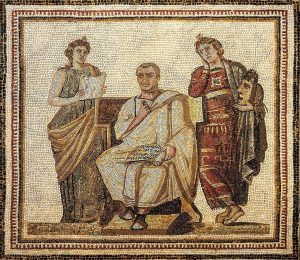Daniel Mendelsohn in The New Yorker:
 Since the end of the first century A.D., people have been playing a game with a certain book. In this game, you open the book to a random spot and place your finger on the text; the passage you select will, it is thought, predict your future. If this sounds silly, the results suggest otherwise. The first person known to have played the game was a highborn Roman who was fretting about whether he’d be chosen to follow his cousin, the emperor Trajan, on the throne; after opening the book to this passage—
Since the end of the first century A.D., people have been playing a game with a certain book. In this game, you open the book to a random spot and place your finger on the text; the passage you select will, it is thought, predict your future. If this sounds silly, the results suggest otherwise. The first person known to have played the game was a highborn Roman who was fretting about whether he’d be chosen to follow his cousin, the emperor Trajan, on the throne; after opening the book to this passage—
I recognize that he is that king of Rome,
Gray headed, gray bearded, who will formulate
The laws for the early city . . .
—he was confident that he’d succeed. His name was Hadrian.
Through the centuries, others sought to discover their fates in this book, from the French novelist Rabelais, in the early sixteenth century (some of whose characters play the game, too), to the British king Charles I, who, during the Civil War—which culminated in the loss of his kingdom and his head—visited an Oxford library and was alarmed to find that he’d placed his finger on a passage that concluded, “But let him die before his time, and lie / Somewhere unburied on a lonely beach.” Two and a half centuries later, as the Germans marched toward Paris at the beginning of the First World War, a classicist named David Ansell Slater, who had once viewed the very volume that Charles had consulted, found himself scouring the same text, hoping for a portent of good news.
What was the book, and why was it taken so seriously? The answer lies in the name of the game: sortes vergilianae. The Latin noun sortes means lots—as in “drawing lots,” a reference to the game’s element of chance. The adjective vergilianae, which means “having to do with Vergilius,” identifies the book: the works of the Roman poet Publius Vergilius Maro, whom we know as Virgil. For a long stretch of Western history, few people would have found it odd to ascribe prophetic power to this collection of Latin verse. Its author, after all, was the greatest and the most influential of all Roman poets. A friend and confidant of Augustus, Rome’s first emperor, Virgil was already considered a classic in his own lifetime: revered, quoted, imitated, and occasionally parodied by other writers, taught in schools, and devoured by the general public. Later generations of Romans considered his works a font of human knowledge, from rhetoric to ethics to agriculture; by the Middle Ages, the poet had come to be regarded as a wizard whose powers included the ability to control Vesuvius’s eruptions and to cure blindness in sheep.
However fantastical the proportions to which this reverence grew, it was grounded in a very real achievement represented by one poem in particular: the Aeneid, a heroic epic in twelve chapters (or “books”) about the mythic founding of Rome, which some ancient sources say Augustus commissioned and which was, arguably, the single most influential literary work of European civilization for the better part of two millennia.
More here.
